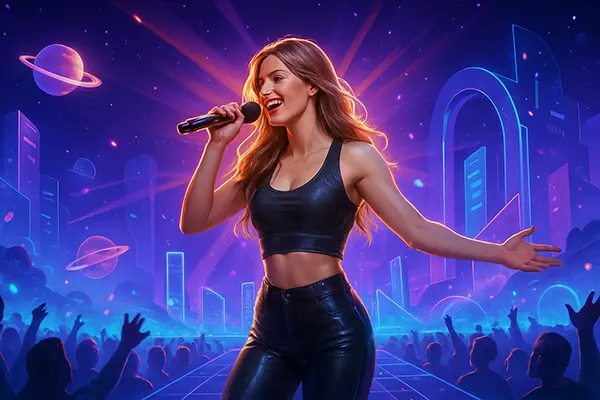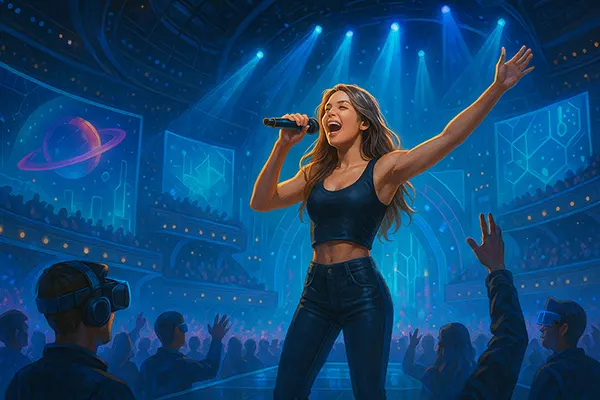
How the Metaverse is Transforming Show Business: The First Virtual Star Tours of 2025
The metaverse has swiftly become a revolutionary force in the entertainment industry. By February 2025, virtual concerts and immersive performances have taken centre stage, reshaping how artists interact with global audiences. Through platforms like Roblox, Fortnite, and Decentraland, stars are pioneering virtual tours that transcend physical boundaries, offering fans new and dynamic ways to experience live music events.
New Formats in the Entertainment Industry: Virtual Concerts in the Metaverse
Virtual concerts have evolved dramatically over the past year. Early experiments during the pandemic set the groundwork, but in 2025, artists are embracing full-scale tours inside the metaverse. Using hyper-realistic avatars and cutting-edge VR technologies, musicians replicate the energy of traditional concerts while reaching millions of fans simultaneously.
Major platforms such as Roblox, Fortnite, and Wave have seen massive investments from both tech firms and record labels. In particular, Travis Scott’s landmark performance in Fortnite, once a novelty, has now become a template for entire world tours, with stars like Ariana Grande, Post Malone, and The Weeknd following suit with upgraded interactive features.
Unlike traditional concerts, these virtual experiences incorporate user-driven elements. Fans can control camera angles, participate in real-time polls that influence the setlist, and even interact directly with performers’ avatars. These innovations have not only expanded artistic expression but also generated entirely new revenue streams through exclusive skins, merchandise, and NFT collectibles.
Examples of Virtual Star Tours in 2024–2025
One of the standout events of 2024 was Billie Eilish’s immersive virtual tour in Decentraland. Rather than performing in a traditional digital venue, her team built a surreal, dream-like world where each song transformed the entire environment, offering a multi-sensory experience that fans could navigate freely.
Meanwhile, K-pop sensation BLACKPINK broke records with their metaverse performance in Fortnite. Their concert attracted over 50 million live attendees, with fans engaging in in-game mini-events tied to the music, dancing competitions, and virtual meet-and-greets with highly detailed avatars of the group members.
Emerging artists are also capitalising on these technologies. British singer Griff launched her debut virtual tour in Roblox in early 2025, presenting an affordable, accessible way to reach an international fanbase without the logistical challenges of physical touring.
Celebrity Reactions to the Metaverse Shift
Many artists initially approached the metaverse with caution. Concerns ranged from technological limitations to fears that virtual performances might lack the emotional resonance of traditional concerts. However, as the technology matured, perceptions shifted rapidly among top stars.
Speaking to Rolling Stone UK in January 2025, Dua Lipa described her metaverse show as “the most creatively liberating experience” of her career. She highlighted the ability to perform impossible stage stunts, such as floating through fantastical cities or dancing with AI-generated creatures, as a major artistic breakthrough.
Ed Sheeran, who partnered with Meta for a hybrid tour combining live stadium shows and simultaneous VR events, commented that the metaverse “isn’t replacing live music — it’s enhancing it.” His strategy of offering layered experiences has been hailed as a blueprint for the future of global touring.
Challenges and Criticism from Artists and Fans
Despite the excitement, virtual tours are not without critics. Some artists argue that no amount of technical sophistication can replicate the visceral energy of standing in a roaring crowd. Additionally, digital exclusivity raises concerns about accessibility, especially for audiences without high-end VR equipment.
From a fan perspective, issues like connection stability, system requirements, and avatar realism remain important. While the overall feedback has been overwhelmingly positive, several concerts in 2024 faced criticism due to server overloads and graphical glitches that impacted the immersive experience.
Artists and developers continue to refine these aspects, with leading studios working on lightweight VR solutions and hybrid formats that bridge the gap between digital and physical participation.

Economic Impact of Virtual Concerts on the Entertainment Industry
The rise of metaverse concerts has had a profound economic impact. By early 2025, the virtual concert market is estimated to be worth over £2.1 billion annually, according to data from MIDiA Research. This growth has been fuelled by ticket sales, virtual merchandise, advertising partnerships, and brand integrations within metaverse platforms.
Record labels and management companies have swiftly adapted. Universal Music Group, for example, established an entire division dedicated to virtual performances, while Epic Games continues to invest heavily in artist partnerships for Fortnite’s ongoing concert series.
Moreover, virtual concerts provide opportunities for monetisation beyond music. Brands like Nike, Gucci, and Coca-Cola have sponsored concerts, designing virtual wearables and interactive experiences that seamlessly blend entertainment and digital commerce.
Future Trends in Virtual Entertainment
Looking ahead, analysts predict that virtual concerts will increasingly blend with emerging technologies like AI-generated performers and holographic projections. Sony Music and Meta are already testing AI-powered “virtual pop stars” capable of generating new songs and performances autonomously.
Hybrid tours — combining live and virtual shows — are set to become the norm. This model allows artists to maximise reach and revenue while providing fans with multiple ways to engage depending on their preferences and resources.
In addition, the democratisation of virtual concert tools may empower independent artists to create high-quality experiences without major label backing, opening new pathways for creative innovation and industry disruption.
